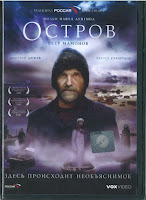
A few weeks ago Joseph Susanka recommended a Russian movie of recent vintage, "The Island." His commentary was so compelling I scrounged around the Internet to find a copy, and I'm glad I did. "The Island" ("Ostrov") goes on my short list of movies in which spirituality is actually caught on screen. I waited until early morning on Holy Saturday to watch it, and, as it turns out, the action takes place between Good Friday and Easter, so to speak.
The story is a simply one, about a man's search for redemption after commiting a crime he cannot put behind him. As the film opens we witness the actual crime, then the film cuts ahead thirty years to images of Fr. Anatoly praying for forgiveness.
Now living in a Russian Orthodox monastery, Fr. Anatoly has gained a reputation as a healer, a saint, in spite of the fact that he never washes, acts the fool, and irritates
his brother monks. The last thing Fr. Anatoly wants is to be revered by anyone
-- he is too aware of his sins, especially his one big sin.The scenes depicting Anatoly's relationship to Father Job, who is jealous of him, and
Father Filaret, his superior, are particularly memorably and probing. Job is jealous of Filaret's admiration of Anatoly, while Filaret charitably excuses Anatoly's excesses before suddenly and painfully discovering the resolute detachment underlying his "foolishness." I didn't know the work of the director, Pavel Lungin, although his films are well-respected and celebrated in the festival circuit. Lungin has lived in France since 1990, but still makes Russian films -- if you read Russian you can learn about his production company here .You may have heard someone talk about the "greatness of the Russian soul." Once you see this movie you may start talking about it yourself -- I have a good friend, a
Slavophile, who never tires about telling about the Russian soul and its stubborn endurance through seventy years of Communism. (And he wasn't talking about the Russian ballet!)The setting of this film is the late 70s, when the Cold War was still raging and glasnost was still nearly a decade away. Who of us thought about the spiritual communities in the Soviet empire which were still thriving, still praying endlessly to their sacred icons?
As the story unfolds, it keeps digging deeper and deeper into the mystery of Anatoly's sin. Just when you think this is a wonderful film depicting the spiritual struggles of a true penitent and its effects on his community the story takes an unexpected and overwhelming turn.
I won't say anymore for fear of spoiling a surprising narrative of the kind you rarely
encounter in the movie theater. "The Island" is a film that, over the years, will make its way into the company of "The Passion of St. Joan of Arc," "The Diary of a Country Priest, and "The Passion of the Christ." It's worth seeking out, as Susanka did, get it from Netflix.





No comments:
Post a Comment